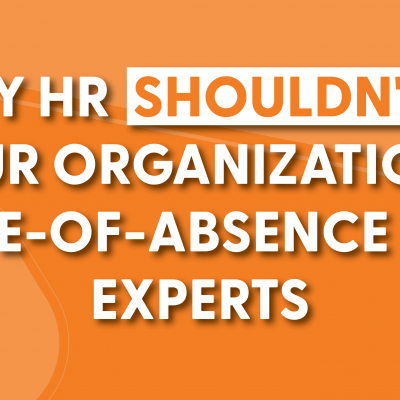Whether you’re the mightiest of HR teams or the nimblest, navigating the intricacies of employment law is an essential aspect of running a successful organization. One area that often requires a deep understanding of these laws is managing employee leave of absence, and while many orgs rely on their HR and People Ops teams to handle these matters, the reality is that you and your team are not, and should not be, the sole experts on leave of absence laws.
Below we’ll break down the reasons why your organization should reconsider placing the entire burden of leave-of-absence law expertise on your team and offer a more collaborative approach to leave law compliance.
Understanding The Evolving Leave Law Landscape
The only constant in the world is change, and leave-of-absence laws are certainly no exception to the rule. Not only do laws vary greatly from state to state, but established laws are subject to change due to legislative updates or court decisions. (Check out our latest U.S. Leave Law Report to stay up to date)
Keeping abreast of these changes is a full-time job in and of itself, and while you’re charged with managing an ever-widening range of functions for your company, it’s unreasonable to expect you to also be legal experts to boot. Leave of absence law is a specialized field that requires in-depth knowledge and continuous education to stay current with the ever-evolving legal landscape.
It’s important to stay current with the laws as best as humanly possible, but your organization should be seeking further expertise if compliance is of any importance (last we checked…it’s sort of a big deal).
Leave Law Risk Management
One of the most compelling reasons, in our humble opinion, for your company to not rely solely on your team for leave of absence law expertise is the significant legal and financial risks involved.
Mistakes in handling employee leave can lead to costly litigation, penalties, and damaged company reputation. Inadequate knowledge of the law can result in non-compliance, leading to expensive legal battles that could have been avoided. To help mitigate these risks it’s recommended to incorporate legal experts or compliance professionals who specialize in employment law to ensure your organization is always in compliance.
Navigating Complexities in Federal and State Leave Laws
If you’re being asked to be your organization’s leave law expert then make sure to budget for a GPS, because navigating the intricate legal landscape surrounding employee leave of absence is akin to walking through a complex maze with a blindfold on.
Federal and state laws create a convoluted web that HR pros must carefully traverse when administering every leave of absence. The primary federal regulations, such as the Family and Medical Leave Act (FMLA), the Americans with Disabilities Act (ADA), and the new Pregnant Workers Fairness Act (PWFA) lay the foundation for leave policies, but states and local jurisdictions often have their own set of unique rules that compound the complexity.
For context, there are over 400 (!) state leave laws, and only about 10% of them cover family and medical leave reasons.
It’s important to know that the concern isn’t only with the diversity of the laws, but also from the nuances of how they interact. For instance, state laws may have lower eligibility requirements, more expansive reasons for leave, broader definitions of “family members” who may be covered, or provide more weeks of job-protected leave than required under federal law. Some state leaves even provide paid leave benefits.
As you can imagine or have experienced first-hand, it can be complicated to know when state leaves should run concurrently with leaves under federal law.
As a result, compliance requires not just a surface-level understanding but a deep and evolving knowledge of these intricacies. Mistakes in understanding and applying these laws have the potential to result in legal troubles, financial liabilities, and damage to an organization’s reputation. That’s not to mention the time and effort spent defending legal actions that could be used for more productive endeavors, or the risk of governmental agencies getting involved and uncovering other concerns that need addressing, which may have long-lasting consequences.
To effectively support your employees and maintain compliance, it’s crucial to engage experts who specialize in employment law, stay up to date with the latest changes in federal, state and local laws (which isn’t as prevalent as you may think), and are well-equipped to offer guidance that ensures organizations are in full compliance.
What Leave Laws Say About Consistency and Fairness
All organizations should operate by treating employees with consistency and fairness in order to establish a healthy work environment. Consistency and fairness, as it turns out, are also critical elements in dealing with employee leave of absence.
Your leave policies not only need to adhere to the letter of the law but also ensure that your employee population is treated equitably and respectfully. Achieving this balance is a delicate task that requires a high level of legal expertise as well as a deep understanding of your organization’s culture and values.
While the latter part of that equation you have down pat, legal experts specializing in leave of absence laws can provide invaluable guidance in crafting policies that are both legally sound and aligned with your organization’s core principles. They can help your team interpret the nuances of laws, regulations and cases–and the interaction of different laws–to determine the most appropriate course of action.
By having legal professionals involved in the process you can foster an environment where employees have confidence in your leave policies and how they’re applied across the organization. This not only minimizes the risk of legal issues but also leads to higher levels of employee trust, engagement, and job satisfaction while sending a powerful message to the workforce that the company is committed to upholding fairness and treating its employees with respect.
More Focus on Your Core HR Functions
Why shouldn’t you be your organization’s leave-of-absence law expert? Quite frankly, you likely already have too many responsibilities that you’re more than qualified to handle to be spending so much time on something that’s outside your area of expertise. Not that you aren’t capable of understanding leave laws if that was your sole job, but the truth is the modern HR team has other priorities to focus on.
Ultimately, this approach benefits the organization as a whole. By entrusting the expertise in leave of absence laws to legal professionals you can focus on organizational initiatives like recruitment, onboarding, training, performance evaluation, employee engagement, and improving the overall operational efficiency of your team. Expecting you to be the primary expert on leave of absence law hinders your ability to focus on these core HR functions effectively, which can be detrimental to the long-term success of your business.
The Value of Relying on Leave Law Experts
Relying on leave law experts offers immense value to any HR or People Ops team looking to consistently administer leaves of absence in accordance with the latest laws. Experts in the field bring deep, up-to-date knowledge of the complex evolving leave of absence laws, reducing legal risks and ensuring compliance.
Their specialized guidance promotes the development of fair, consistent, and culture-aligned leave policies, fostering employee trust and engagement. By entrusting these matters to the experts, you can focus on the work that matters most to you and your employees while delivering a compliant leave experience.
About Tilt
Tilt is leading the charge in all things leave of absence management through easy-to-use tech and human touch. Since 2017, our proprietary platform and Empathy Warriors have been helping customers make leave not suck by eliminating administrative burdens, keeping companies compliant, and providing a truly positive and supportive leave of absence experience for their people.







